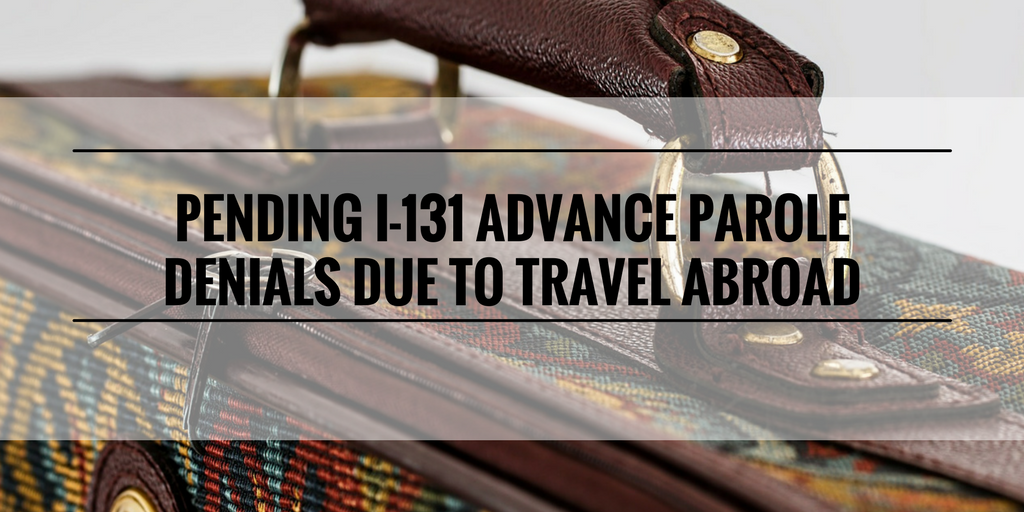Pending I-131 Advance Parole Applications Being Denied Due to International Travel
Our office has recently learned that USCIS is changing their long-standing practice and have started denying Form I-131 Advance Parole applications due to abandonment in cases where the applicant has left the United States while the I-131 Advance Parole application was pending. USCIS has confirmed that this is their actual current policy going forward and that it would apply even for applicants who have a separate valid advance parole document or a valid H, K, L, or V visa to return to the United States.
Reason for Denial of Pending I-131 Advance Parole Due to International Travel
In the denial notification, USCIS cites the Form I-131 instructions at page 6 where it is stated that if the Applicant “depart[s] the United States before the Advance Parole Document is issued, [their] application for an Advance Parole Document will be considered abandoned.” It had been a long-standing practice for USCIS to approve Advance Parole renewal applications for applicants who travel abroad while the Advance Parole is pending with another valid Advance Parole Document or a valid H, K, L, or V visa.
Only I-131 Advance Parole Applications Affected
It should be noted that this guidance applies to I-131 Advance Parole applications and not to I-131 Reentry Permit applications by lawful permanent residents which use the same application form. The I-131 Reentry Permit applications have separate and specific application requirements but generally travel is allowed after a reentry permit is filed and before the document is approved (subject to completion of the required biometrics which normally must be done in the United States).
Recommendations for I-131 Advance Parole Filing
Given this shift in policy, we caution I-131 Advance Parole applicants to plan carefully their application filing with respect to any need for international travel. An advance parole application (especially when filed with EAD) can be filed up to 180 days prior to an existing document’s expiration and we recommend early filings when possible.
If travel is needed, we recommend having either a valid advance parole document or a valid H, L, K or V visa stamp (and continued ability to use that stamp for entry) for the anticipated return date into the United States. For emergency or unforeseen situations, there are ways to seek expedited processing of a pending advance parole application due to emergency international travel or to apply for an emergency advance parole.
In the event an Advance Parole application is denied due to travel abroad then it may be possibly to refile it, in many cases without an additional government filing fee, but the new application will be subject to a new 60-90 days processing timeline.
Conclusion
We will continue monitoring related developments and provide updates. In the meantime, we recommend planning early for advance parole filings (first-time or renewal) and, when possible, scheduling international travel around the anticipated application processing windows.
Please do not hesitate to contact us if we can be of any help in preparing or otherwise assisting with advance parole or travel applications. Also, please feel free to subscribe to our free weekly newsletter to obtain developments on this and related topics.
Related News and Articles
The Capitol Immigration Law Group has been serving the business community for over 15 years and is one of the most widely respected immigration law firms focused solely on U.S. employment-based immigration. Disclaimer: we make all efforts to provide timely and accurate information; however, the information in this article may become outdated or may not be applicable to a specific set of facts. It is not to be construed as legal advice.

